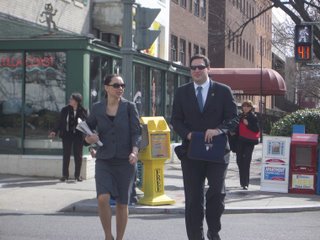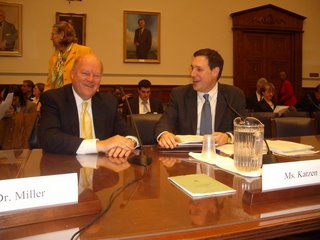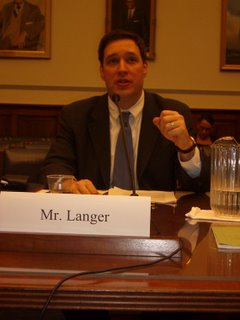Report: Today's Testimony...
It really couldn't have gone any better today - well, except that there were five votes called just after I gave my testimony and Rep. Lynch didn't return to the hearing afterwards. I wanted to answer some of his concerns about TRI reform.
As it was, I was on a panel with, among others, Robert Shull from OMB Watch, and he and I had a bit of back and forth as we answered questions from Chairman Miller.
The Arizona Republic reported on the hearing, too:
http://www.azcentral.com/arizonarepublic/news/articles/0308paperwork.html
Feds assigning 9.5 billion hours of homework
U.S. takes new swipe at reducing red tape
Jon Kamman The Arizona Republic Mar. 8, 2006 12:00 AM
About 9.5 billion hours.That's how much time the public is expected to spend this fiscal year providing information to the federal government for anything from an income-tax return to a report of an injury to a whale.In all, the nation will devote the equivalent of nearly 1.1 million years of round-the-clock work to completing the 8,459 forms, reports, applications, questionnaires, surveys and assorted detritus required under federal regulations.
"Enough!" Congress cried in 1980, when federal collection of information was consuming a little more than 1 billion hours of the public's time.That year, lawmakers passed and President Carter signed a package of would-be restraints known as the Paperwork Reduction Act. Today, with clear evidence that the act and a major overhaul in 1995 aren't working, a subcommittee of the House Committee on Government Reform will hear ideas for curbing the seemingly insatiable federal appetite for collecting information.If the annual demand were spread equally among the nation's 298 million people, fulfilling it would consume about 32 hours per man, woman and child. The burden includes time spent figuring out what is requested, gathering data, making calculations if needed and, perhaps easiest, actually filling out forms.
...
Efforts to cut paperwork are inseparable from the perennial campaign to eliminate many regulations themselves. Andrew Langer, manager of regulatory policy for the National Federation of Independent Businesses and a witness at today's hearing, said he will emphasize the need for "regulations that make sense" and efficient ways of reporting.
...
The burden hits small businesses especially hard, and laws passed in 2002 to give relief have been slow to make much difference, Langer said.
The Small Business Administration calculates that for a business with fewer than 20 employees, the cost of regulatory compliance is about $7,750 per employee per year. How much of that is attributable to fulfilling reporting requirements isn't broken out, but Langer said it remains a major drag on productivity.
Langer said one of his appeals in testimony will be for a computerized system consolidating all rules applying to to various kinds of businesses and allow electronic reporting of data. Forms filled out for one agency could be routed to others that need parts of the information, he said.A computer gateway is now in operation at the business .gov Web site, but it is only in its earliest stages, he said.
"This is 2006, and we should be able to do this," Langer said. "We've got to get serious about this and have the leadership needed to get it done."
----

Walking over to Rayburn

On the stairs in Cannon

Me with Jim Miller, former OMB Chief and first head of OIRA
Behind us is Sally Katzen, who was OIRA director under Clinton

Testifying

0 Comments:
Post a Comment
<< Home